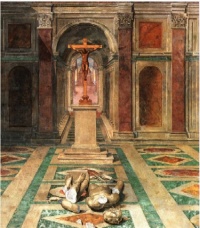Statue
From The Art and Popular Culture Encyclopedia
|
Related e |
|
Featured: |
A statue is a sculpture representing one or more people or animals (including abstract concepts allegorically represented as people or animals), normally full-length, as opposed to a bust, and at least close to life-size, or larger. A small statue, usually small enough to be picked up, is called a statuette or figurine.
The definition of a statue is not always clear-cut; equestrian statues, of a person on a horse, are certainly included, and in many cases, such as a Madonna and Child or a Pietà, a sculpture of two people will also be.
Statues have been produced in many cultures from prehistory to the present; the oldest known statue dating to about 30,000 years ago. The world's tallest statue is over 500 feet.
Many statues are built on commission to commemorate a historical event, or the life of an influential person. Many statues are intended as public art, exhibited outdoors or in public buildings. Some statues gain fame in their own right, separate from the person or concept they represent, as with the Statue of Liberty.
Statues are amongst the wonders of the world, with the Colossus of Rhodes and the Statue of Zeus at Olympia among the Seven Wonders of the Ancient World and the Moai of Easter Island among the wonders of the modern world.
See also
- Bronze sculpture
- Bust
- Colossus
- Equestrian sculpture
- Figurine
- History of sculpture
- List of statues
- List of statues by height
- Living statue
- Memorial
- Monument
- Sculpture
- Statues of Gudea, c.2100 BC
- Stone carving
- Stone sculpture
- The Thinker
- Venus of Willendorf
- Tallest statues
- Capuan Venus
- Venus Pudica
- Crouching Venus
- Greek sculpture
- Human positions



